‘Nothing new’: Tarar confirms cabinet permitted ISI to track phone calls, messages
Federal Law Minister Azam Nazeer Tarar defended the federal cabinet’s decision to grant call tracing powers to the country’s premier spy agency, stating that the government has authorised the use of the tool for the purpose of counter-terrorism and national security.
“This is nothing new. This is nothing unusual. It has been invoked for the last 28 years,” he said on the floor of the National Assembly on Monday.
The federal government has given the Inter-Services Intelligence (ISI) the authority to intercept and trace phone calls and messages.
The federal cabinet has approved a circular that allows a designated ISI officer of grade 18 or higher to carry out the tracing of calls under Section 54 of the Telecommunication (Re-organization) Act 1996, media outlets including BBC Urdu reported on Tuesday.
“The federal government in the interest of national security and in the apprehension of any offence is pleased to authorise the officers to be nominated from time to time by ISI to intercept calls and messages or to trace calls through any communication system,” Ministry of Information issued a notification on Monday.

The move to grant the ISI increased powers to intercept communications comes amid the Shehbaz Sharif government’s efforts to implement stricter regulations on social media, citing national security concerns. This includes the government’s recent ban on the popular social media platform X.
In May, Prime Minister Shehbaz Sharif approved a draft to amend the Prevention of Electronic Crimes Act (PECA) 2016. The amendment proposed the establishment of a Digital Rights Protection Authority.
Additionally, the government is installing a national firewall on various internet service providers (ISPs). This system will allow the filtering and blocking of unwanted content on social media platforms from reaching a wider audience.
The government’s plan includes implementing a keyword filtering system to detect and censor content deemed undesirable or prejudicial to national security. This filter will act as an “information inspector”, effectively making certain posts invisible to outside users.
Posts from all dissenting voices, both within and outside the country, will likely be subjected to this inspection process before being allowed to be fully visible online. This filtering system will be applied across major social media platforms like Facebook, YouTube, and the platform formerly known as Twitter.
Preparations are also under way to prevent the “misuse” of Virtual Private Networks (VPNs) by citizens. The government may mandate that citizens report the VPNs they are using to the Pakistan Telecommunication Authority (PTA). Failure to comply could result in legal trouble.
Read more
Firewall being installed to filter ‘undesirable’ content from Pakistani internet
Audio leaks case: IHC seeks report from govt within six weeks
Govt forms high-level committee to investigate PM House audio leaks
When approached for comments earlier in the day, neither the PTA nor the Minister of State for IT, Shaza Fatima Khawaja, provided any response.
This section of the Telecommunications Act empowers the federal government to authorise any person or entity to intercept communications or trace calls through any telecommunication system.
‘This is not a novel development’
Tarar was speaking in response to the opposition’s concern over the government’s decision. The law minister began his response by saying that there was a constitutional scheme to run the country.
The opposition members countered him, but the law minister warned them that treasury members would also not listen to the leader of the opposition if they interrupted his speech.
“Cannot even think about violating the freedom enshrined in the Constitution,” Tarar said and added that the right of privacy was “subject to law” when dealing with national security and crime detection.
He explained that it was a 1996 law and it was reshaped. “In 1996, Section 54 was worded Pakistan Telecommunication Reorganization Act and 54(1) reads ‘notwithstanding anything contained in the law for the time being enforced in the interest of the national security or in the apprehension of any offence, the federal government may authorize any person or persons to intercept calls and messages or to trace calls through any telecommunication system’.”
Law enforcement agencies and intelligence agencies operate under the aforementioned law and whenever they want access to data or require interception operate under it, Tarar said and added that many big incidents occurred in the country.
“It was this calls interception that linked to the killers of former prime minister Benazir Bhutto and the case was unearthed,” Tarar said, citing that there several cases.
“There has been 28 years since 1996 and there have been five governments. We faced a martial law. Omar Ayub was part of the government during Gen (retd) Pervez Musharraf’s tenure as president. None of the governments changed this provision. This is a law since 1996 and it is intact on that.”
He went on to add that the government issues notification from time to time, authorising agencies and their officers under the law.
“Rather than expanding this domain to 50 agencies as it appears to be indiscipline, so it was bad. The government authorised by notification the premium intelligence agency to make sure that it is used for counterterrorism, national security, and crime detection. It also made them bound to provide the names of officers over the rank of grade 18 and the area allocated to them so that it was not misused.”
When it was sent to the ministry for vetting, Tarar said that it was stated that it was authorised for “enhanced harmonisation” and coordination with other agencies thereby, promoting a “more integrated and effective approach” to addressing national security threats including the menace of terrorism.
The law minister clarified that people’s personal life and privacy would be “considered and action would be taken against those who misuse the law.”
With such a clarification, Tarar said: “This is not a novel development. This is not unusual. It has been invoked for the past 28 years and it is also present in the UK law.” He added that the use of law could be checked.
“I wanted to clarify that these provisions have been present in this sense since 1996. You [the opposition] recently ruled for four years. If it was a draconian or anti-country provision, then you should have omitted this. But things have to be regulated under the law.”
The PTI has announced its decision to challenge the cabinet’s decision in the court.
“SRO 1005 (I)/2024 issued on 8th July, 2024 (attached below) issued by the Form 47 government gives blanket powers to ISI to tap anyone’s phone conversations on the grounds of unspecified ‘National Security’ reasons on the ‘apprehension’ of any offence that may be committed,” Leader of the Opposition in the NA Omar Ayub said in a post on X.
“This blanket cover to an intelligence agency can only be given in a dystopian setting by a fascist government.”
He alleged that PM Shehbaz had cut his “jugular vein” as the ISI would use the tool to hound Bilawal Bhutto, Asif Zardari, Maryam Nawaz, all politicians and media people to blackmail and beat them into submission.
“I will be challenging this black SRO in court through my lawyer, Dr Babar Awan Sahib as it is unconstitutional and against the fundamental rights enshrined in the Constitution.”
For the latest news, follow us on Twitter @Aaj_Urdu. We are also on Facebook, Instagram and YouTube.




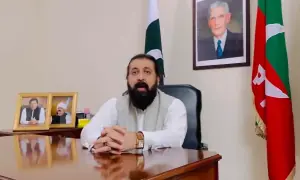
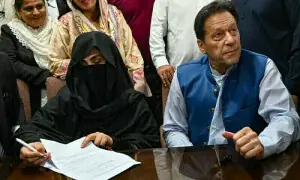




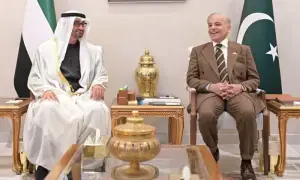
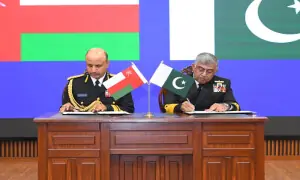
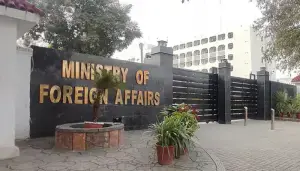
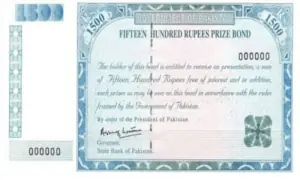


Comments are closed on this story.